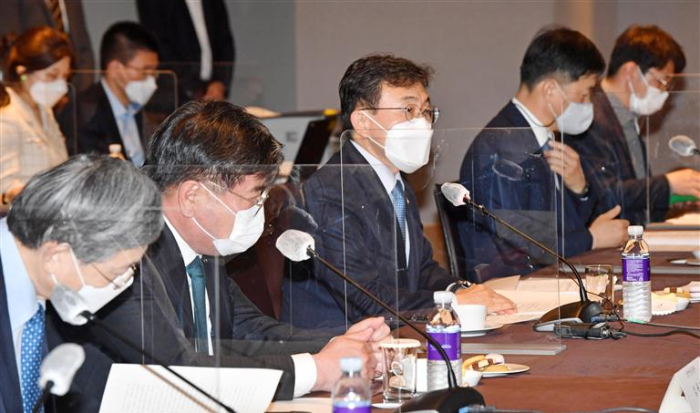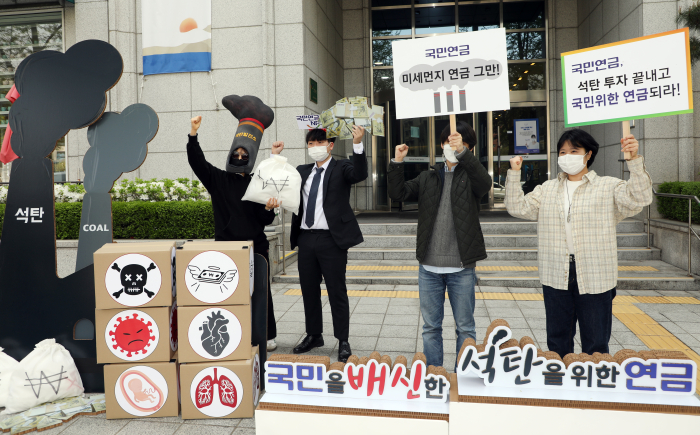NPS shelves plan for negative screening on high emitters
By Apr 30, 2021 (Gmt+09:00)
Samsung shifts to emergency mode with 6-day work week for executives


CJ CheilJedang to sell feed, livestock unit for $1.4 bn


Samsung Electronics' key M&A man returns; big deals in the offing


Affinity to buy SK Rent-a-Car at $572 mn, more deals expected


Keppel REIT to sell Seoul-based prime office T Tower



But the committee endorsed the South Korean pension scheme's decision to authorize its investment division heads to proceed with small-size alternative deals worth up to $100 million apiece, without reporting to its CIO Ahn Hyo-joon, compared to the current threshold of $50 million.
On the proposed negative screening, the 20-member committee supervising the NPS investment management department, chaired by Welfare Minister Kwon Deok-chul, was almost evenly divided, according to the committee sources.
They postponed any decision on the strategy until the next meeting, citing a lack of detailed implementation plans, under which the $775 billion pension fund was expected to either exclude or curtail investment in fossil fuel industries.┬Ā┬Ā
Pension fund sources said that the NPS' negative screening, if approved at the Friday committee meeting, would have been no more than declaratory gesture that needs to be followed by detailed action plans.┬Ā
"NPS, as a top shareholder in some 300 listed companies at home, has an enormous influence on domestic companies," a source of the committee told Market Insight, the capital news outlet of The Korea Economic Daily. "We agreed on the need to respond to climate change, but concluded that a more cautious approach should be taken."┬Ā┬Ā
Last year, the world's third-largest pension fund made preparations to adopt environmental, social and governance (ESG) standards for domestic equities and bond investments.
Given the carbon neutrality initiative that South Korea has pledged to achieve by 2050, the NPS' top decision-making body is highly likely to pass the adoption of negative screening by the first half of next year, pension fund sources said.┬Ā
"To step up response to climate change and tougher environmental regulations, the NPS needs to make risk management efforts," the welfare minister said in an opening speech before Friday's NPS committee meeting.┬Ā

Once approved, negative screening needs to be followed by decisions on whether the NPS will completely weed out coal-related companies or only high carbon emitters from its portfolio, or merely scale back exposure to the coal industry. Then it needs detailed plans on how these actions will be carried out.
The NPS' investments in coal and relevant businesses are estimated at around 10 trillion won ($9 billion) as of the end of March this year, including 1.6 trillion won worth of shares in Korean companies and 2.9 trillion won shares in overseas companies. For the country's largest utility KEPCO, the NPS has invested over 5 trillion won in both shares and bonds.┬Ā
Regarding the NPS, market speculation is that KEPCO and petrochemical companies including GS Caltex Corp, LG International Corp., OCI Co. and Kumho Petrochemical Co. could be negatively affected by negative screening.
But given that those companies also run eco-friendly energy businesses, it would be difficult for the NPS to take drastic steps, say, completely turning its back on them, said the pension fund industry sources.
"Negative screening is ultimately aimed at reducing carbon emissions," said a source from NPS' investment management committee before Friday's committee meeting. "It would be unreasonable if we exclude companies only because their coal-related businesses from the past remain intact."
Another source of the committee said that it was still premature to talk about the NPS' possible action plans for negative screening, given that global pension funds' stance on carbon emitters varies.

BOOST TO ALTERNATIVE INVESTMENTS
Meanwhile, the decision to authorize NPS asset class division heads to make direct investment decisions on up to $100 million apiece is expected to speed up investment execution and boost alternative investments by an additional 15 to 20 deals worth 1 trillion won per year, the NPS said.┬Ā
Since 2018, there has been only one alternative investment worth less than $50 million, which was for infrastructure. That meant almost all of the NPS alternative investments had required endorsement by its CIO since 2018.┬Ā
"Now the CIO will focus on securing big investments, with division heads taking charge of small and mid-sized deals. We will be able to secure more investment opportunities and speed up investment execution," said an NPS source.
With the increased amount of alternative deals authorized by its division heads, the NPS expects the proportion of its alternatives to increase by 0.5 percentage points by 2025.
Write to Jung-hwan Hwang at jung@hankyung.com
Yeonhee Kim edited this article.
-
 Pension fundsNPSŌĆÖ nagging concerns: talent shortage, slow alternative asset growth
Pension fundsNPSŌĆÖ nagging concerns: talent shortage, slow alternative asset growthJan 28, 2021 (Gmt+09:00)
5 Min read -
 NPS looks to expand scope of ESG criteria to step up responsible investment
NPS looks to expand scope of ESG criteria to step up responsible investmentSep 08, 2020 (Gmt+09:00)
3 Min read


